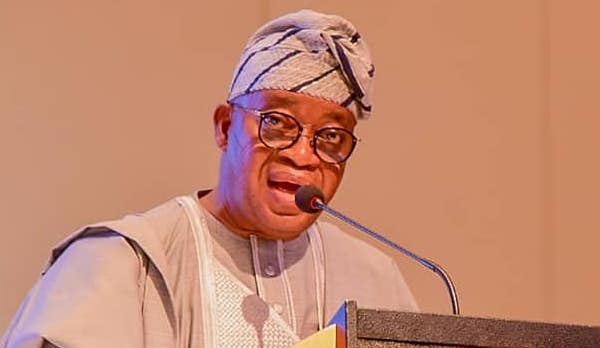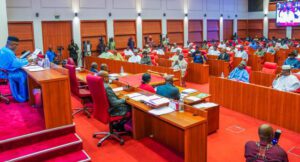
FG approves Inland Dry Ports for Ijebu-Ode, Moniya
By Seun Ibiyemi
President Bola Ahmed Tinubu has granted approval for the establishment and development of Inland Dry Ports (IDP) in Ijebu-Ode, Ogun State, and Moniya, Oyo State, as part of efforts to alleviate congestion at seaports in Lagos, reduce persistent delays, and bolster Nigeria’s economy.
Once completed, these Inland Dry Ports will provide significant employment opportunities for the youth of Ogun, Oyo, and other states in the western region of Nigeria.
The Minister of Marine and Blue Economy, Adegboyega Oyetola, made this announcement in Abuja on Monday, during the 2025 Budget Defence before the Joint Committee of the Senate on Marine Transport and the House of Representatives Committees on Ports and Harbour, Maritime Safety, Education and Administration, Inland Waterways, and Shipping Services.
Oyetola stated that these Inland Dry Ports are prioritised for fast-track development in a bid to decongest the Western Port System. The design consultancies for the project, he confirmed, are already underway.
The Minister also highlighted several critical challenges facing the maritime sector, including infrastructure decay, silted river courses, insufficient fish production, and inadequate river crafts, all of which demand urgent attention. In response, the Ministry is launching a series of projects and initiatives aimed at addressing these issues.
Further elaborating on the government’s plans, Oyetola emphasised the Federal Government’s commitment to consolidating the progress made in the previous year. The focus will be on the continued development of port infrastructure, increasing fish production, enhancing maritime safety and security, deploying information technology to improve operations and revenue generation, building human capacity, and ensuring effective technical and economic regulation to strengthen the blue economy across the nation.
Under the 2024 appropriation, the Ministry finalised the preparation of several key documents, including Nigeria’s National Blue Economy Strategy, the Fisheries and Aquaculture Policy, the Strategic Roadmap for Nigeria’s Blue Economy, and the National Policy for Marine and Blue Economy. These, Oyetola said, form the foundation for a robust policy framework for the Ministry’s future work.
Addressing the Committee, the Minister remarked, “It is a great honour to present before you today, the 2025 Budget Defence of the Federal Ministry of Marine and Blue Economy and its associated Government-Owned Enterprises (GOEs), which include the Nigerian Ports Authority (NPA), the Nigerian Maritime Administration and Safety Agency (NIMASA), the National Inland Waterways Authority (NIWA), the Nigerian Shippers’ Council (NSC), the Maritime Academy of Nigeria, Oron, and the Council for the Regulation of Freight Forwarding in Nigeria.”
He clarified that three of the Ministry’s agencies—NPA, NIMASA, and NSC—are fully self-financing and make substantial remittances to the Consolidated Revenue Fund (CRF/TSA). The remaining agencies, such as NIWA and the Maritime Academy, receive funding from both the Federal Government Budget and internally generated revenue.
The Minister also noted that, following his request, the Council for the Regulation of Freight Forwarding in Nigeria (CRFFN) has been reintroduced into the budget, albeit under the Federal Ministry of Transport, and urged the Committee to address this anomaly.
“The five agencies under the Fisheries and Aquaculture sector, including relevant Institutes and Colleges, are expected to come fully under the Ministry in the 2025 Budget. I seek your cooperation on this,” Oyetola added.
The Minister explained that the 2025 Budget, tagged the “Budget of Restoration: Securing Peace, Rebuilding Prosperity,” will focus on consolidating the previous year’s achievements, with an emphasis on port infrastructure development, fish production, maritime safety and security, IT deployment to improve operations and revenue generation, human capacity building, and effective regulation to support the growth of the blue economy in Nigeria.
Oyetola revealed that the total capital appropriation for the Ministry in the 2024 budget amounted to N10,848,512,984, with N9,973,802,613 already utilised by the end of December 2024. The remaining balance of N874,710,371 will be spent in the first quarter of 2025. Additionally, N191,086,917 was allocated for overhead expenditure, which was fully expended by December 2024.
The Ministry also received a take-off grant of N625,000,000, of which N523,763,955 was committed to the Ministry’s activities, particularly those related to the Fisheries Department.
As a newly established Ministry, Oyetola explained that the focus is on building strong, enduring structures for the effective management of the blue economy sector. He acknowledged the critical infrastructure challenges and pledged that the Ministry is undertaking several projects to address them. He also expressed appreciation for the committees’ review of the legal frameworks governing the sector.
Turning to the 2025 Budget proposal, Oyetola highlighted that it includes major initiatives in the fisheries and aquaculture subsector to increase fish production. These projects, he noted, are tied to government capital budgets to ensure their rapid delivery and to safeguard food security.
The Minister concluded by underscoring the need for significant investment through the capital budget to allow the Ministry to fulfil its mandate and realise the potential of the sector. He called for greater budgetary provisions and requested the Committee’s support in this regard.
Oyetola also thanked the members of the committees for their continued support over the past year and expressed hope for their ongoing cooperation in addressing the Ministry’s pressing needs.




